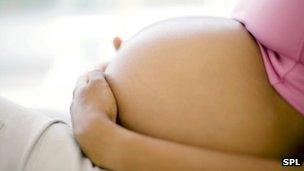Pre-eclampsia predicted using test during pregnancy
- Published

Pre-eclampsia is thought to affect 3-5% of pregnancies
A test carried out during pregnancy could predict which women will develop a potentially fatal condition called pre-eclampsia, scientists say.
Presenting their study to the American Society of Nephrology, researchers said the test detected specific kidney cells in patients' urine.
Out of 15 women who developed pre-eclampsia, all tested positive for the cells.
Experts say a simple, predictive test during pregnancy would be valuable.
Warning sign
Pre-eclampsia is a disorder which appears in the late stages of pregnancy and is characterised by high blood pressure and excess protein in the urine.
Researchers at the Mayo Clinic, who presented their work to the annual meeting of the American Society of Nephrology, external, tested 300 women
Dr Vesna Garovic assessed a test which detects the shedding of kidney cells called podocytes in the urine. The team had previously found podocytes present in patients with pre-eclampsia when they gave birth.
In this study, all the women who went on to develop pre-eclampsia had podocytes in their urine, while none of the 15 who went on to develop high blood pressure or the 44 healthy pregnant women did.
Although carried out on small numbers of women, the researchers say the test is highly accurate for predicting pre-eclampsia and could alert doctors early to the problem.
Ann Marie Barnard, chief executive of Action on Pre-Eclampsia, said an accurate test would help many women.
"A large number of the 1,500 women who call our helpline each year are terrified of becoming pregnant again because they have suffered pre-eclampsia, often with tragic results. Many do decide to go ahead with a new pregnancy anyway.
"Any test which can predict whether they are going to get it again has to be welcomed - while it cannot stop the disease occurring, it would enable services to be more closely focused on them and more alert to signs of the disease developing."
And Andrew Shennan, professor of obstetrics at St Thomas Hospital in London, said: "Being able to use a simple accurate test in pregnancy, such as from a urine sample, would be valuable in identifying those women to watch closely.
"Current tests are not reliable enough, and further work is needed to confirm these promising findings in larger groups."
- Published20 May 2011
- Published13 July 2011
- Published20 April 2011
- Published23 March 2011